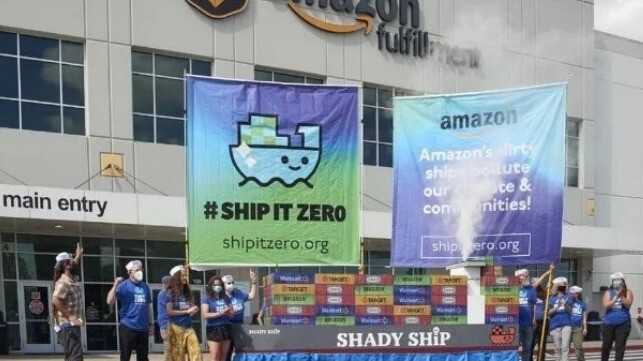Environmentalists’ Report Faults Carriers and Retailers on Decarbonization

Two U.S. environmentalist groups that are working together on a campaign called Ship It Zero are out with a new report card saying the major carriers and the leading retailers are not moving quickly enough to meet the challenges of decarbonization. The groups Pacific Environment and Stand.earth gave most major U.S. retailers and many of the leading container carriers failing or substandard grades on their decarbonization efforts.
“The shipping industry is failing to do its part to address the climate crisis, and today’s report card puts retailers and carrier lines on notice to clean up their shipping problem,” the groups said releasing the results of their analysis of the company’s public policies on decarbonization. They said the report card was designed to evaluate major retailers, mostly U.S.-based, and shipping carriers on their commitment to rapid decarbonization and the development of zero-emission fuels for maritime shipping.
“Our report card clearly shows that, while some retailers and cargo carriers have made progress, there’s still a long way to go,” said Kendra Ulrich, Shipping Campaigns Director for Stand.earth. “Decarbonizing the shipping industry is urgent and we are putting retailers and their cargo carriers on notice. We urge companies to commit to achieving 100% zero-emission, fossil-free ocean shipping by 2030 to ensure a healthier, cleaner tomorrow for our communities and our climate.”
Carriers the groups contend continue to be “over reliant on false solutions like liquified natural gas and scrubbers.” They reviewed 10 of the largest carriers, giving four failing grades. Maersk received the highest overall grade of a B. They argue that the development of alternative fuels is increasing while noting that far more needs to be done to replace fossil fuel ships. Most carriers they said are working on extended timeframes that do not meet the goals of the Paris Accord on climate.
Like other initiatives, the Ship It Zero coalition also looks to use retailers, the customers of the shipping companies, to help drive decarbonization in the maritime sector. Focusing on a group of 18 mostly U.S. brands, the report card gives three-quarters a failing grade. IKEA earns the best score while they give failing grades to major retailers ranging from Walmart to Target, Home Depot, Costco, Samsung, and Dell.
Retailers they content are not accepting their responsibility to decarbonize maritime shipping. The group argues that many retailers are not even quantifying their Scope 3 emissions, which are defined as emissions that a company is indirectly responsible for through its supply chain. Even the retailers reporting Scope 3 the groups contend mostly exclude maritime shipping from their reporting. Only three out of 18 retailers they said are specifically reporting maritime emissions.
The environmental groups also cite the International Maritime Organization as part of the reason shipping is not moving fast enough. They call the recent decisions by the IMO’s Marine Environment Protection Committee accelerating the industry decarbonization targets “not nearly aggressive enough.”

that matters most
Get the latest maritime news delivered to your inbox daily.
The coalition is calling for the end of port pollution taking immediate steps to reduce and eliminate emissions in port. They also want carriers and their retail customers to “put zero at the helm,” developing strategies while moving immediately to reduce greenhouse gas emissions and employ ships using lower-emission fuels.
This is the latest in a series of efforts the coalition has launched to call attention to retailers' indirect contribution to emissions from the shipping companies. In the past, they have staged demonstrations at the officers of major retailers including Amazon and IKEA.
